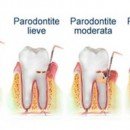Periodontitis: how it manifests itself and how to treat it
Periodontitis (or periodontitis, periodontal disease, or pyorrhea) is an inflammation of the periodontium (the tissues around the tooth) that causes a progressive loss of adhesion of the tooth to the damaged tissues: the tooth becomes “mobile” and, if the periodontitis is not treated in time, it escapes from the dental alveolus. Periodontitis is mainly caused by plaque buildup and poor oral hygiene in general: which is why good prevention is essential (fundamental and quite simple). Its occurrence is linked to the accumulation of plaque, which if not removed gives rise to tartar. Smokers who do not take proper care of oral hygiene are particularly affected, and very often heavy drinkers of alcohol. It goes without saying that, in the context of prevention, if periodontitis is only in its initial stage, the surgery to remove the tartar may already be an effective measure.  If the periodontitis is quite serious and the state of the tissues is compromised, more invasive therapies than periodontal surgery are needed. The main purpose of the surgery is, in this case, the elimination of the gingival and bone pockets, and the techniques vary according to the type of resorption from which the patient is affected. The costs, quite low as regards cleaning, also rise above a thousand euros for the most invasive interventions.
If the periodontitis is quite serious and the state of the tissues is compromised, more invasive therapies than periodontal surgery are needed. The main purpose of the surgery is, in this case, the elimination of the gingival and bone pockets, and the techniques vary according to the type of resorption from which the patient is affected. The costs, quite low as regards cleaning, also rise above a thousand euros for the most invasive interventions.
A tip for smokers and for those at risk: since periodontitis very often, except in cases of gingival bleeding, can be asymptomatic up to the full-blown form, it is good to carry out periodic checks. Since these checks are the responsibility of the dentist, regular cleaning of the teeth is sufficient. The dentist will then notify you of any situations that deserve attention and care.
A tip for everyone: contrary to popular belief, excessive oral hygiene can also be the cause (or cofactor) of periodontitis, especially if you attack your teeth and gums with an inadequate toothbrush and toothpaste. Which means: avoid badly brushing your teeth and rubbing your gums too much , and avoid too aggressive toothpastes, which are easy to identify.





























+ There are no comments
Add yours